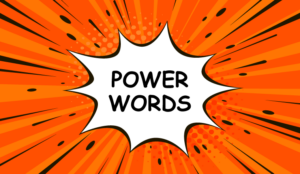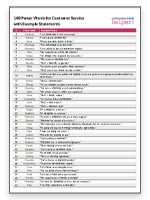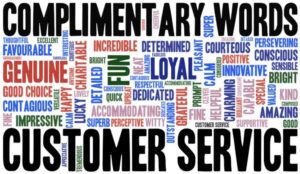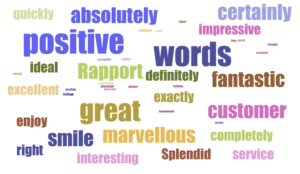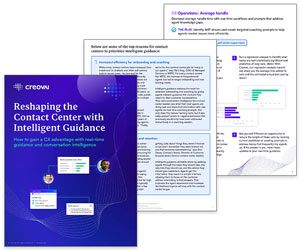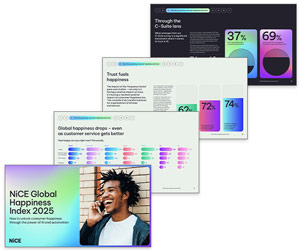Want to skyrocket your CX? Power words can be a game-changer in customer service, helping to evoke the right emotions and create more impactful interactions. In a contact centre setting, using these words strategically can enhance conversations and build stronger connections with customers.
However, it’s important to first consider when and how to use them effectively, ensuring they align with your brand values. Let’s explore the most common power words and how they can add real value to your customer interactions.
What Are Power Words?
Power words are words that we use in conversations to provoke a certain feeling from the person that we are talking to.
These powerful words and power phrases are often used by people who work in fields such as marketing and copywriting, as many can be used as tools for persuasion. This also means that they can be good to use in customer service, to positively influence customer emotions.
So let’s take a look at some common examples of powered words before focusing on those which can be really beneficial to use in the contact centre.
Power Words to Use in Customer Service
Since 2015, in conjunction with our sister publication Presentation Magazine, we have been scanning popular news stories, articles and works of literature to create a list of power words.
In doing so, we have scanned over 15 million words to determine their popularity by counting the frequency in which they are used.
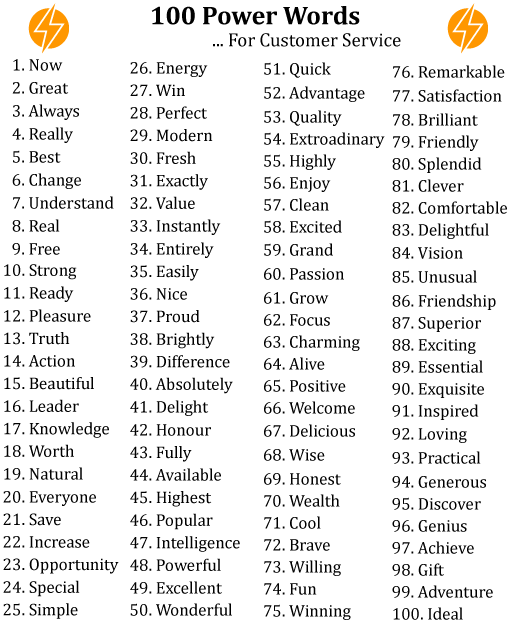
So, let’s take a closer look at the top power words, and share an example of how advisors can embed powerful words into their contact centre interactions and create phrases with power.
12 Great Power Words and Phrases to Use in Customer Service
Let’s start with 12 of the top customer service power words and phrases to use in customer service conversations:
- Now
- Great
- Always
- Really
- Best
- Change
- Understand
- Real
- Free
- Strong
- Absolutely
- Easily
Now lets explain why they can be used to great effect in customer service conversations and examples of how they can be used in the contact centre.
1. Now
It is great to a reassure the customer of their query’s importance to your business and, to do this, it is good to provide them with a sense of immediacy. “Now” is a great power word to help you do so.
“Let’s resolve this issue for you now.”
2. Great
We’ve all written an email in which we have to request something of somebody, but worry that we sound a little too demanding. In customer service writing, this feeling is multiplied.
So, using “great” in a sentence like the example below can help to alleviate any concerns that you might have.
“That’s a great question!”
Example of this power word in customer service – “It would be a great help if you could…”
3. Always
We want customers to feel confident in our ability to solve to solve their problem, so sometimes it is great to give them a guarantee, and “always” is the ideal power word for doing so.
“We always strive to provide the best service.”
4. Really
Sometimes, we want to emphasize one key point and the power word “really” is great for doing this.
For instance, if you have to present two key options to a customer but believe that one is much better for them than the other, this power word can be a useful tool – if used just like in the example below.
“I really appreciate your patience.”
5. Best
When a customer chooses to do business with us, we want to take away any hesitations that they may have. Using the word “best” helps to give the customer a little comfort that they are on the recommended plan/scheme.
“We want to ensure you get the best experience.”
6. Change
This can be a great word to use with an upset customer, after you’ve let them vent and shown empathy, because you are highlighting to them that you are immediately going to do something to remove the source of frustration.
“We can change your plan to better suit your needs.”
7. Understand
We all recognize the importance of showing empathy in the contact centre and saying “I understand” can really help to lift a weight off the customer’s back.
It is particularly great if we draw on our own experiences beforehand, just like in the example below, to single ourselves out from the wider company and offer a more personalized experience.
“I have experienced a similar problem recently, so I understand what you are saying.”
8. Real
If you are listing a number of key features, options or benefits of a product, using the word “real” before introducing a key item on the list, like in the example below, can really focus the customer’s attention on this one specific point.
“The real benefit of this option is…”
Example of this powerful word in customer service – “The real benefit of this option is…”
9. Free
Everyone likes to get something for free. The word “free” therefore helps to spike our interest, as it signals that we, as the customer, might soon be offered something special.
“You can try this service free for 30 days.”
10. Strong
“Strong” is a particularly good power word to use when describing something that the customer has done. It both helps to reassure the customer and emphasize that they have the “power” or control when it comes the final decision making.
“I think that you’ve made a very strong choice.”
11. Absolutely
There’s no ambiguity when using the word ‘absolutely’. It helps agents convey to customers that they can help with their query and gives them added confidence that they are in safe hands.
“I can absolutely fix that for you today.”
12. Easily
Easily is a great power word for agents to include in conversations – particularly when explaining any next steps or processes customers need to follow. It helps to reassure customers.
“This information can be submitted easily by following the link I’ve emailed across to you.”
However, just because these are great examples of powerful words, that doesn’t mean that there aren’t others that will work well in the contact centre space.
100 Examples of Power Words to Use in Customer Service
If you are looking for more powerful words to use in customer service conversations, we have also put together a list of 100 power words, including the twelve above, for you:
| # | Power Word | Example Phrase |
|---|---|---|
| 1 | Absolutely | “I can absolutely fix that for you today.” |
| 2 | Achieve | “I can help you achieve this.” |
| 3 | Action | “I’ll take immediate action to fix this.” |
| 4 | Advantage | “Take advantage of our latest offer.” |
| 5 | Adventure | “Let’s embark on this new adventure together.” |
| 6 | Alive | “Our support team is alive with solutions.” |
| 7 | Always | “We always strive to provide the best service.” |
| 8 | Available | “This service is available now.” |
| 9 | Beautiful | “That’s a beautiful suggestion!” |
| 10 | Best | “We want to ensure you get the best experience.” |
| 11 | Brave | “Thank you for your brave decision to switch.” |
| 12 | Brightly | “We’ll resolve this issue quickly and brightly so you can get back to enjoying your product without any further hassle.” |
| 13 | Brilliant | “That is a brilliant idea!” |
| 14 | Change | “We can change your plan to better suit your needs.” |
| 15 | Charming | “You have a charming way of explaining things.” |
| 16 | Clean | “Our system ensures a clean user experience.” |
| 17 | Clever | “That’s a clever solution.” |
| 18 | Comfortable | “We want you to feel comfortable.” |
| 19 | Cool | “That’s a cool feature!” |
| 20 | Delicious | “That’s a delicious deal!” |
| 21 | Delight | “It’s a delight to assist you.” |
| 22 | Delightful | “It’s delightful to assist you.” |
| 23 | Difference | “We make a difference with our customer support.” |
| 24 | Discover | “Discover the benefits of our service.” |
| 25 | Easily | “This information can be submitted easily by following the link I’ve emailed across to you.” |
| 26 | Energy | “I’m going to bring a lot of energy to finding the right solution.” |
| 27 | Enjoy | “I hope you enjoy our service.” |
| 28 | Entirely | “I’ll handle this entirely for you.” |
| 29 | Essential | “Your feedback is essential.” |
| 30 | Everyone | “Everyone here is dedicated to helping you.” |
| 31 | Exactly | “That’s exactly what we aim to do.” |
| 32 | Excellent | “You’ve made an excellent choice.” |
| 33 | Excited | “I’m excited to help you today.” |
| 34 | Exciting | “This is an exciting opportunity.” |
| 35 | Exquisite | “You’ve chosen an exquisite product.” |
| 36 | Extraordinary | “We provide extraordinary support.” |
| 37 | Focus | “Let’s focus on resolving this issue.” |
| 38 | Free | “You can try this service free for 30 days.” |
| 39 | Fresh | “Let’s take a fresh look at your account.” |
| 40 | Friendly | “Our support team is friendly and helpful.” |
| 41 | Friendship | “We value the friendship we have with our customers.” |
| 42 | Fully | “I am fully committed to resolving this.” |
| 43 | Fun | “I’ll try to make the process fun and easy.” |
| 44 | Generous | “Thank you for your generous support.” |
| 45 | Genius | “That was a genius idea!” |
| 46 | Gift | “Consider this a gift from us.” |
| 47 | Grand | “It’s a grand opportunity for savings.” |
| 48 | Great | “That’s a great question!” |
| 49 | Grow | “Our services can help your business grow.” |
| 50 | Highest | “We hold ourselves to the highest standards.” |
| 51 | Highly | “We highly recommend this option.” |
| 52 | Honest | “We value honest feedback.” |
| 53 | Honour | “It’s an honour to help you today.” |
| 54 | Ideal | “This is an ideal choice for you.” |
| 55 | Increase | “We can increase your service speed.” |
| 56 | Inspired | “We’re inspired by your feedback.” |
| 57 | Instantly | “We can instantly update your information.” |
| 58 | Intelligence | “Our system uses advanced intelligence to assist you.” |
| 59 | Knowledge | “Our team has the knowledge to assist you.” |
| 60 | Leader | “We’re the leader in customer satisfaction.” |
| 61 | Loving | “We have a loving approach to customer care.” |
| 62 | Modern | “We’re committed to providing modern customer support, so if you need any help, our team is available 24/7 via chat, email, or phone.” |
| 63 | Natural | “It’s natural to have concerns.” |
| 64 | Nice | “It’s nice to speak with you.” |
| 65 | Now | “Let’s resolve this issue for you now.” |
| 66 | Opportunity | “This is a great opportunity to upgrade.” |
| 67 | Passion | “We have a passion for helping customers.” |
| 68 | Perfect | “That’s a perfect choice!” |
| 69 | Pleasure | “It’s been a pleasure to help you today.” |
| 70 | Popular | “This is one of our most popular services.” |
| 71 | Positive | “We aim for a positive outcome.” |
| 72 | Powerful | “Our tools are powerful and effective.” |
| 73 | Practical | “That’s a practical solution”. |
| 74 | Proud | “We’re proud to have customers like you.” |
| 75 | Quality | “We pride ourselves on quality service.” |
| 76 | Quick | “I’m aiming to provide a quick solution.” |
| 77 | Ready | “I’m ready to help you right now.” |
| 78 | Real | “The real benefit of this option is…” |
| 79 | Really | “I really appreciate your patience.” |
| 80 | Remarkable | “That’s a remarkable suggestion!” |
| 81 | Satisfaction | “We guarantee your satisfaction.” |
| 82 | Save | “You can save 20% with this discount.” |
| 83 | Simple | “It’s a simple process to get started.” |
| 84 | Special | “We have a special offer for you.” |
| 85 | Splendid | “That sounds like a splendid plan!” |
| 86 | Strong | “I think that you’ve made a very strong choice.” |
| 87 | Superior | “Our services are superior in quality.” |
| 88 | Truth | “The truth is, we value your feedback.” |
| 89 | Understand | “I have experienced a similar problem recently, so I understand what you are saying.” |
| 90 | Unusual | “That’s an unusual request, but we can handle it.” |
| 91 | Value | “We offer a range of services that add significant value, including free upgrades and extended warranties.” |
| 92 | Vision | “Your vision aligns with our goals.” |
| 93 | Wealth | “We offer a wealth of resources.” |
| 94 | Welcome | “Welcome to our service family.” |
| 95 | Willing | “We’re willing to go the extra mile.” |
| 96 | Win | “You can win a free gift with your purchase.” |
| 97 | Winning | “You’ve made a winning choice.” |
| 98 | Wise | “You’ve made a wise decision.” |
| 99 | Wonderful | “That’s a wonderful idea!” |
| 100 | Worth | “We want to make sure you get your money’s worth.” |
We hope that some of these words inspire you to use more power words in your customer service conversations.
Printable – 100 Power Words for Customer Service with Example Statements
Do you want to download this to share with your team?
Get your free download of 100 Power Words for Customer Service with Example Statements now:
Other Power Words Suited to Contact Centres
Two key examples of other power words that are well suited to the contact centre space include “something” and “willing”, as we discuss below.
Say “Something” Not “Anything”
Research from linguists who work at Loughborough University found that, particularly in the medical or retail fields, when someone asks: ‘Is there anything else I can do for you?’ that sounds more negative than saying: ‘Is there something else that I can help you with?’
As Sandra Thompson, founder of Exceed All Expectations, says: “Not only does ‘something’ sound more positive, asking the question: ‘Is there anything else I can help you with?’ when you haven’t solved the original query, that’s not going to go down too well.”
So, if you have to ask this question, it is better to say: ‘Is there something else that I could help you with?’, as that will more likely lead to a more positive outcome.
The Word “Willing” Allows the Customer to Feel in Control
As a contact centre, we want to be speaking with calm customers who are fully in control of their situation. The power word “willing” can be a great tool to use to help them to get into this frame of mind.
Sandra adds: “This is all to do with making the customer perceive that you are putting the control with them in making their decision.”
“So instead of saying: ‘Do you think you could…?’, it’s better to say: ‘If you’re willing…?’, as that changes the emphasis and people respond far more positively.”
Tips to Best Use Power Words in the Contact Centre
We’ve introduced the 100 most popular power words, highlighted how they can be used in customer service and shared a couple of contact centre specific examples. But we are not quite done yet!
Before you start adding these power words and phrases into your scripts or asking advisors to try them out for themselves, please think about the following three things.
Certain Power Words May Not Be Appropriate in a Formal Context
Power words are great to emphasize our points in a friendly, informal setting. But when things get serious, it can be better to forget about power words and get straight to the point.
When it comes to bad news, customers want every guarantee that you’re taking the matter seriously, so a formal tone is more appropriate.
As Sandra says: “Generally customers prefer us to use informal language, as opposed to formal language, when we are talking to them. But if you’ve got a bit of bad news, being informal does not work.”
“When it comes to bad news, customers want every guarantee that you’re taking the matter seriously, so a formal tone is more appropriate.”
In these situations, we don’t want advisors to be thinking; “What power word should I add in?” We want the team to be fully focused on the customer.
Consider Which Power Words Echo Your Values
Our approach to customer service will likely depend very much on the values of our brand and therefore our customers. This should also be reflected in our use of power words and phrases.
Sandra says: “Brands will often have series of words and phrases that their advisors are highly likely to use, in respect to their sector and values.”
“As long as they are simple, understandable terms I think it’s only right that they are woven into all forms of communication, so we are providing the consistency that our customers expect.”
So, it’s great to be consistent with our use of power words and phrases, but – in terms of using brand-specific language – just beware of using cultural jargon, as it has the potential to confuse customers.
Use Power Words to Back Up Bad News

While we should not use power words when delivering bad news, they can be very useful in terms of turning a negative situation around.
Sandra adds: “If you have bad news, you should give it up front and follow that up with the good news, as this makes the conversation far more palatable for the customer.”
“To do otherwise would work against the laws of behavioural science, which suggest that the peak state of customer emotion should be a good feeling that people are left with.”
To find out more about the science behind customer emotions, read our article: 7 Steps to Evoke the Emotions You Want From Your Customers
8 Customer Service Words and Phrases to Avoid
When adding power wording into your agents scripts, you also need to consider removing words and phrases that risk doing more harm than good.
For example:
- “Your call is important to us.”
- “Our apologies for any inconvenience this may cause.”
- “Thank you for the feedback.”
- “Unfortunately, I can’t do that for you.”
- “Can you send a letter?”
- “I’m sorry you feel that way.”
- “Can I help you with anything else today?”
- “I’m sorry. I don’t understand.”
For more tips and strategies to better use of language in the contact centre, read our articles:
- Replace These Negative Words With Positive Alternatives for Customer Service
- Customer Psychology: The Key to Better Contact Centre Conversations
- The Right Words and Phrases to Use on a Sales Call
Author: Jonty Pearce
Reviewed by: Hannah Swankie
Published On: 24th Jul 2019 - Last modified: 14th Aug 2025
Read more about - Skills, Customer Service, Free Downloads, Language, Positive Words, Rapport, Sandra Thompson, Skill Development





